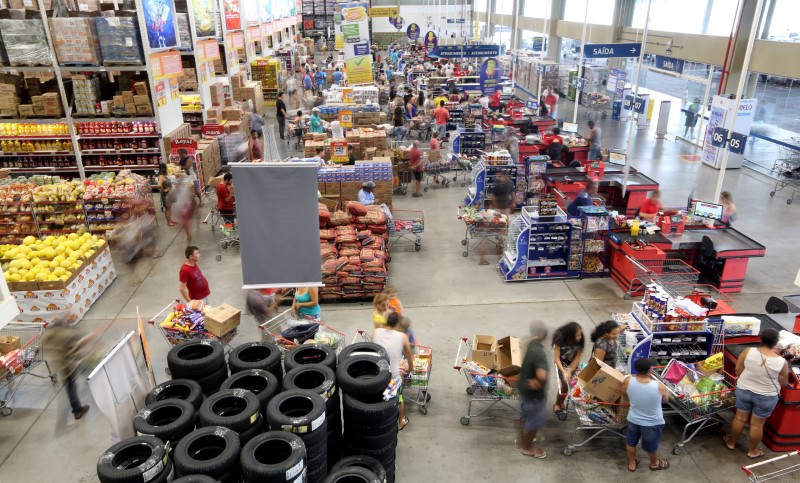By Bruno Federowski
SAO PAULO (Reuters) - Brazilian policymakers and economists have for years promised that a surge in corporate investment would lift Latin America's largest economy out of its worst recession. Investors are not buying it.
While consumers are loosening their purse strings, Brazilian companies must deal with heavy debt loads and employ idle capacity before they boost investment in new machines or facilities, economic data shows.
Instead the economic recovery has some investors betting that consumer-facing firms - such as retailers, healthcare companies and apparel makers - are better positioned to benefit from Brazil's first economic growth in three years, outperforming heavy industry.
That defies expectations that an upswing in capital spending would lay the groundwork for the recovery, fueled by President Michel Temer's business-friendly reforms as well as sharp interest rate cuts.
After private investment fell 30 percent since 2013, Finance Minister Henrique Meirelles forecast in June that it would recover faster than consumer spending.
Economists at Morgan Stanley (NYSE:MS) had also stressed the case for an investment-driven recovery while Itaú BBA analysts recommended buying stocks in the capital goods sector this year.
That story is now looking far-fetched.
Marcelo Toledo, chief economist at Bradesco Asset Management, said households have already turned the corner on cutting debt but companies are only are only a quarter of the way toward cleaning up their balance sheets after the crisis.
Net debt at 263 listed companies tracked by financial data provider Economática has declined 16 percent from a 2015 peak but is still more than double what it was five years ago.
In contrast, household debt as a percentage of income has returned to levels last seen in 2011, central bank data showed.
Business leaders may also be shelving capital spending plans until after a wide-open 2018 presidential race, with several populist candidates in the wings.
"As long as companies prioritize deleveraging, they will not pursue any new investments," he said. "It will take a long time before investments return to levels needed to fuel growth rates of 3 percent or 4 percent."
CONSUMERS VS INDUSTRY
Some investors are catching on.
An index tracking retailers and consumer goods companies on the São Paulo Exchange (ICON) is up 23 percent this year. The median net revenue of those companies rose 6 percent in the second quarter from a year ago, the biggest rise in a year and a half, according to a Reuters analysis of earnings statements.
On the other hand, the bourse's industrial index (INDX) rose just 12 percent, lagging an 18 percent increase by the benchmark Bovespa stock index (BVSP).
Industrial companies saw net revenue slip 2 percent in the three months through June, the fifth straight quarter of decline.
Alexandre Silvério, who manages 1.9 billion reais of stocks as head of equities at AZ Quest Investimentos Ltda, said he is banking on consumer goods and retailers to outperform other sectors in the coming quarters.
"Those are the big winners," Silvério said.
With demand recovering slowly and debt levels forcing players in several sectors to sell assets, many firms are prioritizing mergers and acquisitions over new capital spending as a means to expand.
Investment has fallen to levels barely enough to maintain capacity. Capital spending at companies covered by Fitch Ratings amounted to only 1.1 times depreciation in 2016, compared to 2.2 times four years earlier.
To cut its huge debt, oil company Petróleo Brasileiro SA (SA:PETR4) has sold assets and cut its five-year investment plan — the world's largest program of its kind in 2012 at nearly $250 billion — to less than $100 billion.
Steelmaker Usinas Siderúrgicas de Minas Gerais SA (SA:USIM5) is using just 60 percent of its capacity after investing 14 billion reais from 2008 to 2014 in plants that came on line in the middle of Brazil's recession and a global steel crisis.
"Our focus now is what to do to get all our installed capacity working," Chief Executive Sergio Leite said last month, commenting on capital spending that has fallen to around 250 million reais per year.
Meanwhile, employment and retail sales data have shown an upswing in recent months, leading economists to raise forecasts for this year.
Brazil's GDP is expected to grow 0.4 percent in 2017, according to a central bank survey of economists, after shrinking 8 percent over the prior two years.
